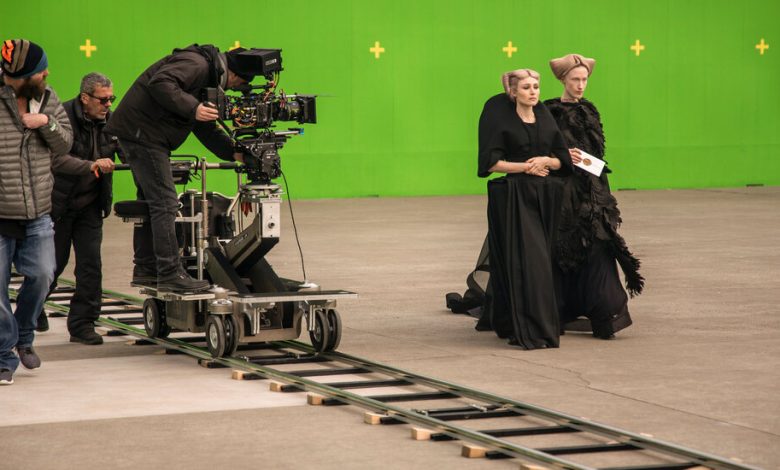The Strange $55 Million Saga of a Netflix Series You’ll Never See

Near the height of the streaming boom in the fall of 2018, a half-dozen studios and video platforms lined up to woo a little-known filmmaker named Carl Erik Rinsch. He had directed only one movie, “47 Ronin.” It was a commercial and critical dud, and Mr. Rinsch’s tussles with its producers had raised eyebrows, even in an industry where such conflicts are the norm.
But memories in Hollywood are short, and the demand for new content was intense. In just a decade, the number of scripted TV shows had soared from 200 to more than 500, with new streaming services from Disney, Apple and NBCUniversal on the way. Amid the feeding frenzy, the project that Mr. Rinsch was pitching — a science-fiction series about artificial humans — became a hot property.
After a competitive auction, Mr. Rinsch and his representatives reached an informal eight-figure agreement with Amazon. But before they had a chance to put it in writing, Netflix swooped in. Cindy Holland, the company’s vice president of original content at the time, called Mr. Rinsch at home on a Sunday and dangled millions of dollars more, as well as something studios rarely gave directors: final cut.
Netflix won the deal — and would soon come to regret it.
The project with Mr. Rinsch has turned into a costly fiasco, a microcosm of the era of profligate spending that Hollywood studios now are scrambling to end. Netflix burned more than $55 million on Mr. Rinsch’s show and gave him near-total budgetary and creative latitude but never received a single finished episode.
Soon after he signed the contract, Mr. Rinsch’s behavior grew erratic, according to members of the show’s cast and crew, texts and emails reviewed by The New York Times, and court filings in a divorce case brought by his wife. He claimed to have discovered Covid-19’s secret transmission mechanism and to be able to predict lightning strikes. He gambled a large chunk of the money from Netflix on the stock market and cryptocurrencies. He spent millions of dollars on a fleet of Rolls-Royces, furniture and designer clothing.
Mr. Rinsch and Netflix are now locked in a confidential arbitration proceeding initiated by Mr. Rinsch, who claims the company breached their contract and owes him at least $14 million in damages. Netflix has denied owing Mr. Rinsch anything and has called his demands a shakedown.
It’s not uncommon for Hollywood productions to run into trouble, but a debacle of this magnitude is rare. And it has surfaced at an inopportune moment, with Hollywood under pressure from investors to cut back on lavish spending and to focus on making profits rather than adding streaming subscribers at any cost. That squeeze is only expected to intensify. Hollywood studios’ recent agreements to pay writers and actors more are likely to further pinch profits.
Mr. Rinsch declined to respond to a detailed list of questions. In a recent Instagram post, he said he did not cooperate with The Times because he expected the article to be “inaccurate.” He predicted that it would “discuss the fact that I somehow lost my mind … (Spoiler alert) … I did not.”
Thomas Cherian, a spokesman for Netflix, said the company had provided substantial funding and other support to Mr. Rinsch’s series, but “after a lot of time and effort, it became clear that Mr. Rinsch was never going to complete the project he agreed to make, and so we wrote the project off.”
‘The Organic Intelligent’

Mr. Rinsch, who won advertising awards for a short film in 2010, always had a quirky side, friends said.Credit…Santiago Cerini
By all accounts, Mr. Rinsch, 46, is a talented filmmaker. The youngest son of an insurance executive, he grew up in California’s San Fernando Valley and started renting camera equipment and shooting short films in his early teens. After attending Brown University, he returned to Los Angeles and joined Ridley Scott’s production company, making commercials and apprenticing under the acclaimed director.
Friends say Mr. Rinsch always had a quirky side. He had a habit of telling tall tales about his childhood, claiming that he grew up in Africa and that his father was a spy. While living at the Huntley Hotel in Santa Monica for a stretch, he insisted that the staff cover every inch of his room in white sheets.
Mr. Rinsch’s career began to take off in 2010 when a short film he made for the Dutch electronics maker Philips won top awards at the Cannes Lions international advertising festival.
There was talk that Mr. Rinsch would direct a prequel to “Alien,” Mr. Scott’s 1979 sci-fi classic, for his feature film debut. Instead, Universal Studios hired him to direct “47 Ronin,” a big-budget action movie starring Keanu Reeves.
The project encountered difficulties. Mr. Rinsch clashed with Scott Stuber, one of the producers, and at one point was removed from the editing room, according to a person familiar with what happened. When the film was released on Christmas Day in 2013, it bombed. Universal had to write off a large portion of its $175 million budget.
Mr. Rinsch went back to making commercials. On the side, he and his wife — a Uruguayan model and fashion designer, Gabriela Rosés Bentancor — began working on a passion project: a sci-fi TV series about a genius who invents a humanlike species called the Organic Intelligent. The O.I. are deployed to trouble spots around the globe to provide humanitarian aid, but humans eventually discover their true nature and turn against them. Mr. Rinsch called the show “White Horse,” a reference to the first horseman of the apocalypse.
At first, Mr. Rinsch financed the production with his own money and hired mostly European actors and crew members, which reduced costs and avoided Hollywood union rules. The early shoots followed punishing schedules. During a shoot in Kenya, Mr. Rinsch insisted on filming for 24 hours straight, two members of the production said. In Romania, the lead actress caught hypothermia doing a scene barelegged in the snow and had to be rushed to a hospital, they said.
To keep the project going, Mr. Rinsch secured an investment from 30West, a production company backed by the billionaire entrepreneur Dan Friedkin. But when Mr. Rinsch missed a deadline, 30West threatened to take possession of the project. Mr. Reeves, the Hollywood star, who had become friends with Mr. Rinsch during the shooting of “Ronin,” came to his rescue by investing in the show and becoming a producer alongside Ms. Rosés.
With the money Mr. Reeves contributed, Mr. Rinsch finished editing six short episodes ranging from four to 10 minutes. He used them to pitch the big streaming companies on a 13-episode, 120-minute first season. At the time, streaming services were in an expensive arms race for content to attract new subscribers. Netflix, in particular, was lavishing money and creative control on top creators like Shonda Rhimes and Ryan Murphy. Hollywood was also open to new show formats. Quibi, a short-form video platform conceived by Jeffrey Katzenberg, the former DreamWorks Animation chief, had just been founded to much fanfare.
Mr. Rinsch’s pitch attracted interest from Amazon, HBO, Hulu, Netflix, Apple and YouTube. Amazon — which had shown its willingness to spend big by paying nearly $250 million for the rights to make a television show based on J.R.R. Tolkien’s “The Lord of the Rings” — looked set to win the bidding. But Netflix snatched the project away at the last minute, convinced it had the potential to become a sci-fi franchise as successful as “Stranger Things” that could spawn sequels and spinoffs.
The company agreed to pay $61.2 million in several installments for the rights to the series, which it renamed “Conquest,” according to a November 2018 term sheet reviewed by The Times. The deal included two unusual clauses: Netflix gave Mr. Rinsch final cut, a privilege it had previously bestowed on only a few directors. And it assured Mr. Rinsch and Ms. Rosés that they would remain “locked for life” to all subsequent seasons and spinoffs.
In granting Mr. Rinsch such generous terms, Netflix ignored several red flags. One was the project’s troubled past. At the time, Mr. Rinsch was still fighting with 30West and other early investors. (They received $14 million of the $61 million from Netflix under a legal settlement.) Another was the fact that the series didn’t have a script; Mr. Rinsch had based the first six episodes on a story that he had thought up in his head.
Netflix also overlooked Mr. Rinsch’s checkered reputation in Hollywood. Mr. Stuber, the producer who had clashed with him on “Ronin,” had joined Netflix’s movie division a year earlier. Ms. Holland, the company’s head of original content, didn’t consult him before buying “Conquest.”
Punching Holes in a Wall
With Netflix’s big-money commitment, Mr. Rinsch now had to deliver. Shooting of the remaining episodes of “Conquest” got underway in São Paulo, Brazil, and then in Montevideo, Uruguay, and in Budapest.
In São Paulo, the local film industry union dispatched a representative to the set after receiving a complaint that Mr. Rinsch was “mistreating the team” with “shouts,” “cursing” and “excessive irritation,” according to a letter the union sent Netflix’s local production partner. Netflix was informed of the issue and addressed it with Mr. Rinsch, a person familiar with the matter said.
In Budapest, Mr. Rinsch went days without sleep and accused his wife of plotting to have him assassinated, two people who witnessed the outburst said.
Ms. Rosés later said in a court filing in her divorce case that Mr. Rinsch’s behavior had started to change even before the overseas shoots. On several occasions, he had thrown things at her and twice punched holes in a wall.
Mr. Rinsch has said he was diagnosed with autism and attention deficit hyperactivity disorder and took medications for both. Ms. Rosés and some crew members worried about his use of Vyvanse, an amphetamine that is commonly prescribed to treat A.D.H.D. When overused, the drug can have serious side effects, including mania, delirium and even psychosis, according to psychiatrists.
After filming wrapped up in Budapest in late 2019, Ms. Rosés hired a behavioral health consultant to try to persuade Mr. Rinsch to enter rehab. Accompanied by Mr. Reeves, one of Mr. Rinsch’s brothers and several members of the “Conquest” crew, the consultant staged an intervention at Mr. Rinsch’s Los Angeles home, several people who attended said. Mr. Rinsch agreed to let a sober companion stay with him, but he sent him packing within a couple of days, the people said.
In March 2020, as the coronavirus pandemic was reaching U.S. shores, Mr. Rinsch asked Netflix to send him more money. The company had already spent $44.3 million on “Conquest.” Mr. Rinsch had missed several production milestones and was toggling between two versions of the script, a shorter one that matched the original 13-episode plan and one twice as long that would have required greenlighting a second season.
Netflix initially resisted Mr. Rinsch’s demand for more funds, but it relented when he claimed the whole production risked collapsing without an immediate cash injection.
Netflix wired Mr. Rinsch’s production company $11 million, bringing its total outlay to more than $55 million. It gave Mr. Rinsch permission to use some of the new money to do preproduction work on the longer version of the script. The caveat was that if Netflix didn’t sign off on the expanded script after five weeks, Mr. Rinsch had to use the rest of the money to finish and deliver the originally agreed-upon first season.
Mr. Rinsch transferred $10.5 million of the $11 million to his personal brokerage account at Charles Schwab and, using options, placed risky bets on the stock market, according to copies of his bank and brokerage statements included in the divorce case. One of his wagers was that shares of the biotech firm Gilead Sciences, which had announced that it was testing an antiviral drug on Covid patients, would soar. Another was that the S&P 500 index, which had already declined more than 30 percent, would fall further. Mr. Rinsch lost $5.9 million in a matter of weeks.
In the following months, he behaved more erratically. Like many people, he was deeply affected by the pandemic, and he espoused strange theories about the coronavirus, according to text messages and emails reviewed by The Times. When Ms. Rosés went to check on him in June 2020, he took her to a scenic lookout in the Hollywood hills and pointed at planes overhead. They were “organic, intelligent forces” that “came to say hi,” he told her, according to Ms. Rosés’s filing in the divorce case. He also sent her texts claiming that he could predict lightning strikes and volcanic eruptions.
At Netflix, Ms. Holland, too, was witnessing some of Mr. Rinsch’s behavior. He was sending her text messages, which The Times reviewed, containing bizarre doodles with incomprehensible annotations.
Yet Ms. Holland didn’t realize the extent of the problem until Ms. Rosés reached out in July 2020. She informed Ms. Holland and another Netflix executive, Peter Friedlander, about Mr. Rinsch’s state. Two days later, she filed for divorce.
In September 2020, Netflix shook up its management team. Ms. Holland and another executive involved with Mr. Rinsch’s contract would leave the company.
A few months later, Mr. Friedlander and a Netflix business affairs executive, Rochelle Gerson, called Ms. Rosés. They wanted to know whether she could get access to the show’s footage so they could figure out what still needed to be done to complete the first season. When Ms. Rosés told them that she didn’t feel comfortable doing so without Mr. Rinsch’s approval, Ms. Gerson worried that Mr. Rinsch might have an “explosive response” if Ms. Rosés broached the matter with him.
Ms. Gerson soon began receiving emails from Mr. Rinsch in which he claimed, among other things, to have found a way to map “the coronavirus signal emanating from within the earth.”
Netflix executives grew so concerned with Mr. Rinsch’s behavior that they consulted with the Los Angeles Police Department’s threat management unit, a person with knowledge of the matter said. A Police Department psychologist reviewed Mr. Rinsch’s texts and emails and concluded that he didn’t seem like a threat to himself or others.
Five Rolls-Royces and a Ferrari
Netflix no longer saw a way forward with the production. On March 18, 2021, Ms. Gerson informed Mr. Rinsch by email that Netflix had decided to stop funding “Conquest.” She told him that he was free to shop it elsewhere but that any acquirer would have to reimburse Netflix for what it had spent.
Mr. Rinsch sent angry emails to Ms. Gerson and a Netflix lawyer, accusing them of breaching his contract. In one email, he addressed the subject of his mental health. “To state it simply, I am of sound mind and body,” he wrote.
Mr. Rinsch had begun using what remained of the $11 million that Netflix had wired his production company to place bets on crypto. He transferred more than $4 million from his Schwab account to an account on the Kraken exchange and bought Dogecoin, a dog-themed cryptocurrency, according to an account statement reviewed by The Times. Unlike his stock market investments, this one paid off: When he liquidated his Dogecoin positions in May 2021, he had a balance of nearly $27 million.
“Thank you and god bless crypto,” an elated Mr. Rinsch wrote in an online chat with a Kraken representative.
Mr. Rinsch then went on a spending spree. He bought five Rolls-Royces, a Ferrari, a $387,630 Vacheron Constantin watch and millions of dollars’ worth of high-end furniture and designer clothing. The tab came to $8.7 million, according to a forensic accountant hired by Ms. Rosés.
By then, Mr. Rinsch’s divorce from Ms. Rosés had turned acrimonious. Her legal team suspected that the purchases were designed to hide Mr. Rinsch’s crypto winnings.
Mr. Rinsch responded in a deposition that the cars and furniture were props for “Conquest” and that he had paid for them with Netflix’s production money. But in his arbitration case with Netflix, he took a different position: In confidential filings reviewed by The Times, he argued that the money was contractually his and that Netflix owed him several more payments totaling more than $14 million.
Netflix disagrees. In a motion it filed in July, the company said the payments were contingent on Mr. Rinsch’s hitting various production milestones, which it contends he never did. The case went to a hearing before an arbitrator this month. A ruling is expected soon.
Nicole Sperling contributed reporting.



